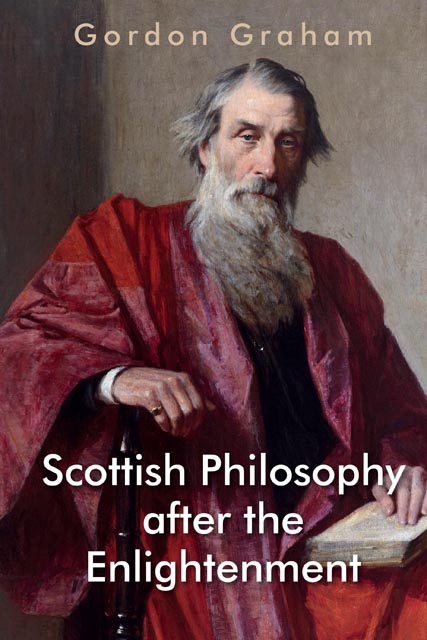Book contents
- Frontmatter
- Contents
- Preface and Acknowledgements
- Series Editor’s Introduction
- A Note on Women in Scottish Philosophy: Mrs Oliphant
- A Chronology of Scottish Philosophy after the Enlightenment
- 1 An Autobiographical Prologue
- 2 Sir William Hamilton and the Revitalisation of Scottish Philosophy
- 3 James Frederick Ferrier and the Course of Scottish Philosophy
- 4 Psychology and Moral Philosophy: Alexander Bain
- 5 Thomas Carlyle and the Philosophy of Rhetoric
- 6 Hegelianism and its Critics
- 7 Scottish Philosophy’s Progress
- 8 Religion, Evolution and Scottish Philosophy
- 9 The Gifford Lectures and the Re-affirmation of Theism: Alexander Campbell Fraser
- 10 The Culmination of Scottish Philosophy: A. S. Pringle-Pattison
- 11 John Macmurray and the Self as Agent
- Bibliography
- Index
Preface and Acknowledgements
Published online by Cambridge University Press: 07 June 2023
- Frontmatter
- Contents
- Preface and Acknowledgements
- Series Editor’s Introduction
- A Note on Women in Scottish Philosophy: Mrs Oliphant
- A Chronology of Scottish Philosophy after the Enlightenment
- 1 An Autobiographical Prologue
- 2 Sir William Hamilton and the Revitalisation of Scottish Philosophy
- 3 James Frederick Ferrier and the Course of Scottish Philosophy
- 4 Psychology and Moral Philosophy: Alexander Bain
- 5 Thomas Carlyle and the Philosophy of Rhetoric
- 6 Hegelianism and its Critics
- 7 Scottish Philosophy’s Progress
- 8 Religion, Evolution and Scottish Philosophy
- 9 The Gifford Lectures and the Re-affirmation of Theism: Alexander Campbell Fraser
- 10 The Culmination of Scottish Philosophy: A. S. Pringle-Pattison
- 11 John Macmurray and the Self as Agent
- Bibliography
- Index
Summary
This book is the result of several years of reading and reflection in an area of the history of philosophy that has generally gone almost entirely unexplored. For this reason, it cannot address an established readership – since no such readership exists. Accordingly, it seemed best to present the results of my reading and reflection in a series of free-standing essays, each with a distinctive focus that may catch the newcomer’s attention. Written on the reasonable assumption that readers interested in philosophy are likely to know little or nothing of the period, the style is sometimes rather elementary. While each essay is meant to be independent of the rest, they all touch on larger and recurring themes, even those that are focused on a single philosopher. Inevitably, the relative independence of each essay means that the same material recurs in several different chapters. I have tried to avoid straightforward repetition, and noted interconnections between chapters here and there. But the nature of the subject matter puts a limit on how far this is possible. The opening essay is autobiographical and relates the story of how I came to study nineteenth-century Scottish philosophy in the first place. In telling it, I hope very much that I have avoided any self-indulgent element. The second essay, on Sir William Hamilton, is a substantially revised amalgamation of two previously published essays. An earlier version of the essay on religion and evolution appeared in the Journal of Scottish Philosophy. A version of the chapter on Thomas Carlyle was circulated in the ‘Occasional Papers’ of the Carlyle Society. Chapter 9 reuses a small amount of material from my contribution on the Gifford Lectures to the three-volume History of Scottish Theology edited by David Fergusson and Mark W. Elliot. The remaining material is new, and several of the essays, especially Chapters 8, 9 and 10, are an attempt to make good what I now see to be important omissions from Scottish Philosophy in the Nineteenth and Twentieth Centuries (Oxford University Press, 2015).
The book might be called an ‘act of piety’, in the proper and best sense. That is to say, it is the acknowledgement of a debt owed, and a tribute due, to historical forebears who are at risk of being neglected.
- Type
- Chapter
- Information
- Scottish Philosophy after the Enlightenment , pp. vi - viiPublisher: Edinburgh University PressPrint publication year: 2022



